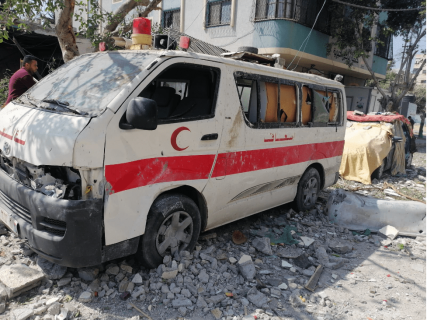
Special Focus: Al-Haq Condemns Israel’s Targeting of Health Facilities and Workers in the Gaza Strip
Date: 1 June 2021
Updated: 4 June 2021
Introduction
The Gaza Strip has been suffering from 14 years of a brutal and inhumane Israeli-imposed military land and sea closure, which has left its health system with an inadequate health infrastructure, dearth of medicine, lack of service capacity and electricity and fuel deficiencies, amounting to an illegal collective punishment of the civilian population. In 2018, the World Health Organization documented that Gaza had only 23 primary health centers providing for emergency medical services, for a total population of 1,899,291.[1] The coronavirus pandemic is exacerbating the already concerning humanitarian situation of the health sector in the Gaza Strip, now on the verge of collapse due to shortage of medical materials, oxygen-generating machines and ventilators, as well as intensive care beds.[2]
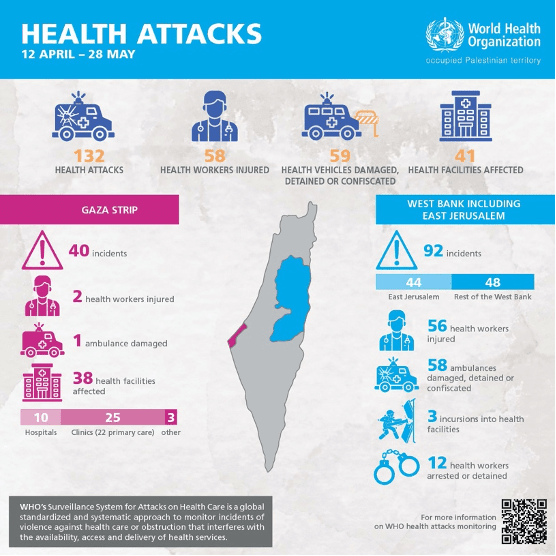 The targeting of health facilities and health workers has been a recurring pattern of Israel’s attacks on the Gaza Strip. Already during Israel’s 2014 military offensive on the Gaza Strip (‘Operation Protective Edge’), the occupying forces damaged 17 of 32 hospitals, as well as 45 primary health centers, causing respectively 6 out of the 17 of them to close during the active hostilities.[3] At the time, Al-Haq reported the direct targeting of health facilities, in particular the Al-Rahma Association for the Disabled, and nine hospitals, killing 6 civilians and injuring more than 70.[4] Continuing its policy of targeting healthcare facilities Al-Haq documented substantial damage to healthcare facilities, including coronavirus testing centers and health administrative buildings, during Israel’s 10-21 May military offensive on the Gaza Strip. In a statement, Health Minister, Dr. Youssef Abu Al-Rish, in the wake of the bombing of the Ministry of Health and Al-Rimal Clinic, denounced "the targeting and the injury of a number of health staff”.[5]The World Health Organization (WHO) has documented the injury of two health workers on duty between 12 April and 28 May in the Gaza Strip, with 38 health facilities affected in attacks including 10 hospitals and 22 primary care clinics.
The targeting of health facilities and health workers has been a recurring pattern of Israel’s attacks on the Gaza Strip. Already during Israel’s 2014 military offensive on the Gaza Strip (‘Operation Protective Edge’), the occupying forces damaged 17 of 32 hospitals, as well as 45 primary health centers, causing respectively 6 out of the 17 of them to close during the active hostilities.[3] At the time, Al-Haq reported the direct targeting of health facilities, in particular the Al-Rahma Association for the Disabled, and nine hospitals, killing 6 civilians and injuring more than 70.[4] Continuing its policy of targeting healthcare facilities Al-Haq documented substantial damage to healthcare facilities, including coronavirus testing centers and health administrative buildings, during Israel’s 10-21 May military offensive on the Gaza Strip. In a statement, Health Minister, Dr. Youssef Abu Al-Rish, in the wake of the bombing of the Ministry of Health and Al-Rimal Clinic, denounced "the targeting and the injury of a number of health staff”.[5]The World Health Organization (WHO) has documented the injury of two health workers on duty between 12 April and 28 May in the Gaza Strip, with 38 health facilities affected in attacks including 10 hospitals and 22 primary care clinics.
Indiscriminate Attacks on an Ambulance Post and Health Facilities, including a Vaccination Center, Throughout the Offensive
Throughout the hostilities, healthcare facilities, in addition to road infrastructure essential to its proper functioning, have been indiscriminately impacted. On 11 May 2021, the Israeli Occupying Forces (IOF) severely damaged two health clinics north of Gaza City, the Indonesian Hospital and Hala al-Shawa Health Center, forcing paramedics to evacuate and causing the health center to stop services completely.[6] The administrative unit of the Indonesian hospital rattled and its ceilings collapsed as a result of the explosion.[7] On the same day, IOF targeted and attacked the 10-storey Al-Jawhara Tower, Dabit Junction, Al-Rimal neighborhood in the center of Gaza City, containing a number of health clinics.[8] Also on 11 May 2021, the IOF targeted empty land adjacent to the Hala Jamil Al Shawa care center, Beit Lahia, severely damaging the building. The center is devoted to mother and child health services, including children’s vaccinations. The Ministry of Health announced that the center has to be put completely out of service.[9] On 11 and 12 May 2021, Israeli warplanes bombed empty land in Izbt Abd Rabbo, causing damage to the Palestine Red Crescent Society ambulance station, located at the Izbt Abd Rabbo roundabout.
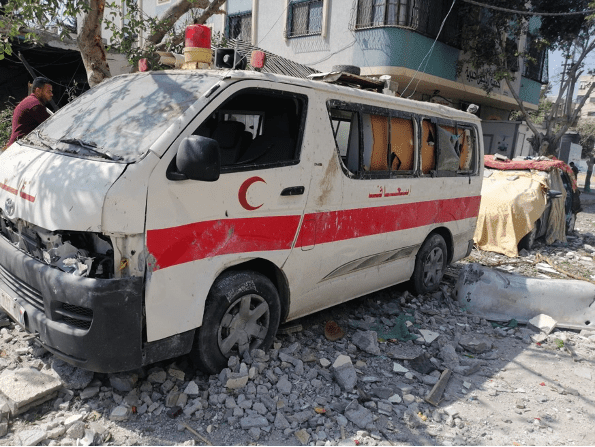
An ambulance was damaged in the bombing of Al-Batnji and Al-Badawi buildings, northern Gaza. © Al-Haq, 20 May 2021
16 May 2021: Crippling Al-Shifaa Hospital’s Main Road Artery and Killing of Two Paramedics
On the night of 16 May 2021, the IOF targeted and completely destroyed, with at least 50 missiles and without prior warning, several residential buildings of Al-Rimal neighborhood, Gaza City,[10] causing the death of 30 civilians, including 11 children. The headquarters of Doctors Without Borders were also destroyed in the bombardment.[11] The bombing resulted in the killing of 30 civilians, including 11 children and 9 women.[12] Two doctors were killed in the strike: Doctor Ayman Tawfiq Abu Auf, 50, serving as Director of Internal Medicine, and Doctor Moeen Ahmed Hassan al-Aloul, 67, a specialist in neurosurgery.[13] The bombardment caused severe damage to Al-Wehda street, the main road leading to Al-Shifaa hospital, the largest medical facility in Gaza. It also impaired the Churches Union junction, severely damaging the main roads leading to Al-Wehda street, blocking the road connection between Abu Talal junction and Dabit junction.[14] The missiles created a massive crater destroying the entire road. The crater has prevented ambulances from leaving or reaching the hospital, prevented patients’ movement to and from the hospital, and prevented the wounded from accessing emergency health care services.
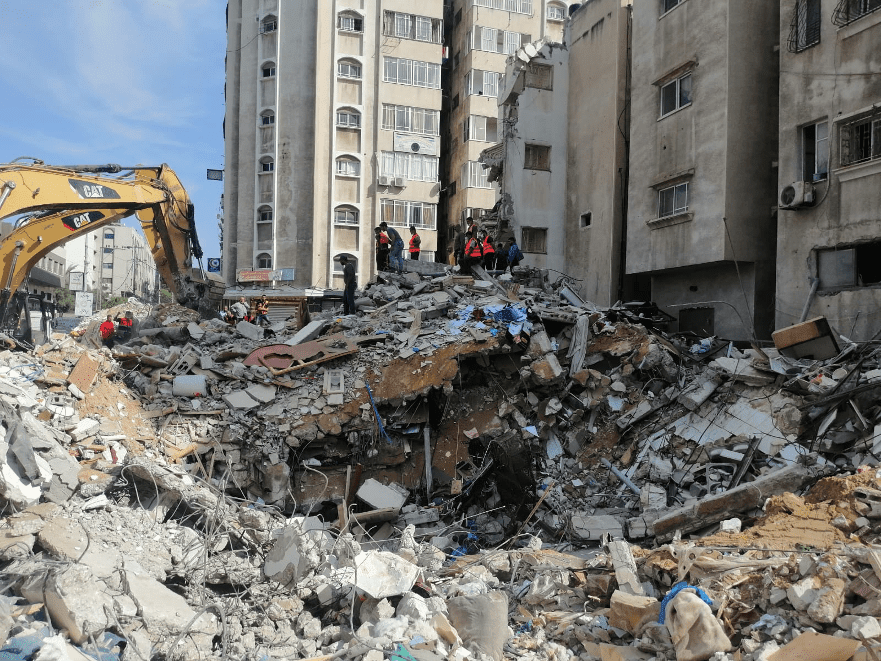
Al-Wehda Street, leading to Al-Shifaa hospital © Al-Haq, May 2021
17 May 2021: Targeting of Palestinian Health Ministry Buildings and of the Only Coronavirus Test Center
At approximately 6:45 pm on 17 May 2021, Israeli warplanes targeted, without prior warning, the last three floors of the Ghazi Shawa six-floor building, located opposite to the Rimal Martyrs Center, known as Al-Rimal Clinic, and to the administrative building of the Palestinian Ministry of Health, in the middle of Al-Wehda Street, Al-Rimal neighborhood, Gaza City.[15] The Ghazi Shawa building notably contained the Dakhhani laboratory, the Basma Clinic for medicine and dental implants, as well as a number of doctors’ clinics. [16] The bombardment killed two civilians, including Rafif Murshed Kamel Abu Dyer, 10,and his uncle, Ziad Kamel Abdullah Abu Dayer, 54, and injured 10 others.[17] The shelling extensively damaged the Al-Rimal Clinic and the administrative building of the Ministry of Health in Gaza, shattering a large number of windows, doors and offices, and some health rooms, leaving the building courtyard replete with rubble and broken glass.[18]
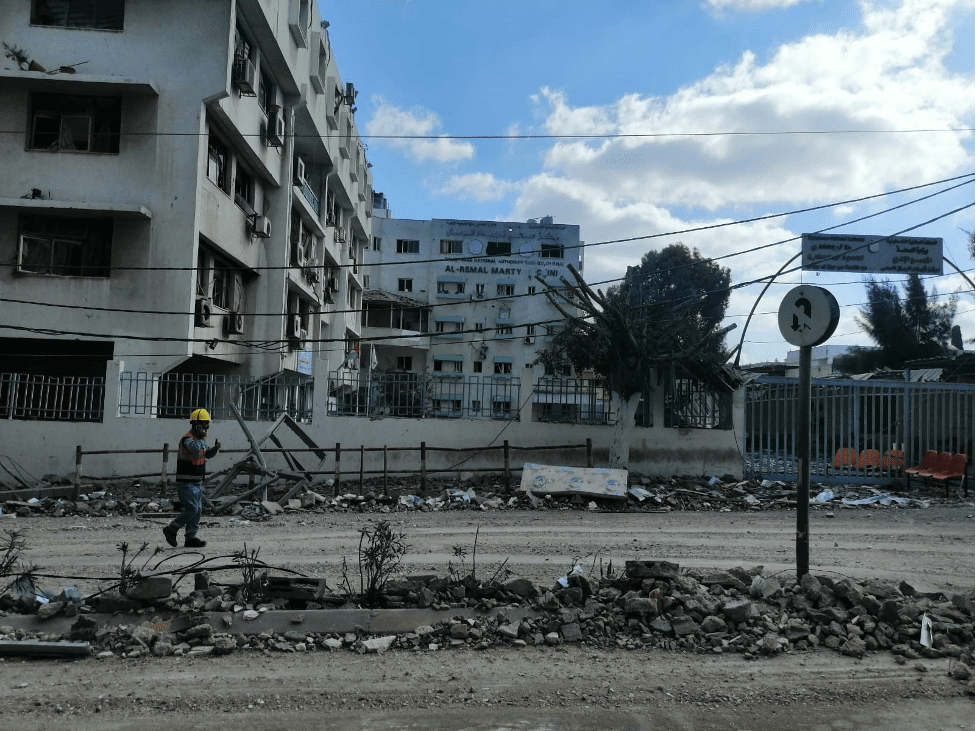
Ministry of Health Building © Al-Haq, May 2021
During a press conference, the Under Secretary of the Ministry of Health, Dr. Youssef Abu Al-Rish, denounced the devastating effect the shelling had on the delivery of coronavirus-related health care. The bombing injured 103 medical staff members working in the central laboratory, in telemedicine, and medical services. The central laboratory, the only functioning coronavirus test center in the Gaza Strip, was forced to close, the Ministry of Health ceased its direct contact service, and a number of doctors stopped providing medical consultations to patients.[19]
Legal Analysis: Sweeping Violations of General Principles of IHL, in addition to the Protected Status of Health Workers and Health Facilities
Violations of the General Customary Principles of Distinction, Proportionality and Prohibition of Indiscriminate Attack against Civilians and Civilian Facilities
As civilians and civilian objects, paramedics, health workers, health centers and health ministry buildings are protected under the customary principles of distinction, proportionality, and the prohibition of indiscriminate attack.
- Article 48 of the First Additional Protocol to the Geneva Conventions stipulates that “the Parties to the conflict shall at all times distinguish between the civilian population and combatants […]”.[20]
- In addition, Article 51(4) prohibits indiscriminate attacks, that “are not directed at a specific military objective [or] employ a method or means of combat which cannot be directed at a specific military objective […] and consequently, in each such case, are of a nature to strike military objectives and civilians or civilian objects without distinction.”[21]
- Finally, the principle of proportionality in attack, enshrined in Article 51(5)(b) of Additional Protocol I, prohibits attacks that would excessively affect civilian life and cause excessive damage to civilian objects in comparison with the concrete and direct military advantage anticipated.[22]
Accordingly, attacks may only target combatants and be directed at a specific military objective, and must be weighed against the incidental loss of civilian life and damage to civilian objects. As such, the indiscriminate targeting of buildings housing medical facilities cannot be justified by military necessity, and incidental damage to health buildings, and the functioning of health services, especially in a territory already on the verge of collapse, should be considered unlawful under international law. Moreover, the targeting of the Al-Rimal neighborhood, causing more than 30 civilian casualties, including two paramedics, cannot be considered as proportionate to the effective military objective sought by the Israeli Occupying Forces.
The bombing and sudden closing of a number of health centers and facilities, the disruption of essential services due to the injuries of medical workers, and in particular, the closure of the only coronavirus test center, have caused the discharge of patients, depriving them from appropriate care. Bombardments have badly damaged and extensively destroyed civilian medical properties, including equipment. Under customary international humanitarian law, “the destruction […] of the property of an adversary is prohibited, unless required by imperative military necessity.”[23]
Violation of the Protected Status of Medical Personnel, Medical Activities and Units
By targeting various buildings housing health clinics, and most particularly the Al-Rimal neighborhood and causing severe damage to Al-Wehda main artery leading to Al-Shifaa hospital, the IOF have caused grave delays in the delivery of medical aid, in particular the evacuation of victims and their transfer to emergency care units, on the top of partially crippling the functioning of the hospital itself. As a result, the IOF have caused additional casualties and deteriorating war injuries, in violation of multiple provisions of international humanitarian law:
- Violation of the protected status of hospitals. Under Article 27 of the Hague Regulations, “in sieges and bombardments all necessary steps must be taken to spare, […] hospitals, and places where the sick and wounded are collected, provided they are not being used at the time for military purposes.”[24] It is supplemented by Article 18 of the Fourth Geneva Convention according to which civilian hospitals “may in no circumstances be the object of attack, but shall at all times be respected and protected […].”[25] The general rule is “to spare hospitals as far as is humanly possible.”Where hospitals are located in close proximity to a military objective, the belligerent should “take precautions to ensure that hospitals should suffer as little as possible from the attacks and from hostilities in general.” [26] By attacking main road arteries leading to Al-Shifaa hospital, the IOF have partially crippled the functioning of the hospital itself, which amounts to making the hospital the object of the attack in and of itself.
- Infringement on medical crews’ access to health facilities. Under Article 15(4) of the First Additional Protocol to the Geneva Conventions, “civilian medical personnel shall have access to any place where their services are essential.” Mobility and access are essential conditions to the provision of health services.[27] By “where their services are essential,” it is entailed that medical health teams should move freely between hospitals and sites where victims are located, under medical justification.[28]
On two occasions, the IOF directed an attack at an empty land in the close vicinity of an ambulance station of the Palestinian Red Crescent, causing severe damage to the structure. Under customary humanitarian law, directing attacks “against medical […] objects displaying the distinctive emblems of the Geneva Conventions in conformity with international law” is prohibited.[29] The damage caused during the first bombing should have constituted sufficient warning for the IOF to take precautions and avoid any additional collateral damage to the Palestinian Red Crescent in the course of the second bombing.
Disruption of Provision of Medical Care in the Context of the Coronavirus Pandemic
The Israeli Occupying Forces’ attacks gravely disrupted the provision of medical care related to the coronavirus pandemic. The only coronavirus test center operational in the entire Gaza Strip was rendered disabled as a consequence of the 17 May attack. As the Occupying Power of the Gaza Strip, Israel is obligated to provide “to the fullest extent of the means available to it […] medical supplies […],” as per Article 55 of the Fourth Geneva Convention.[30] More precisely, under Article 56 of the Fourth Geneva Convention, always “to the fullest extent of the means available to it, the Occupying Power has the duty of ensuring and maintaining […] the medical and hospital establishments and services […] with particular reference to the adoption and application of the prophylactic and preventive measures necessary to combat the spread of contagious diseases and epidemics.”[31] This notably includes “supervision of public health, education of the general public, the distribution of medicines, the organization of medical examinations and disinfection, the establishment of stocks of medical supplies, the dispatch of medical teams to areas where epidemics are raging, the isolation and accommodation in hospital of people suffering from communicable diseases, and the opening of new hospitals and medical centers.”[32] It is complemented by Article 14(1) of the First Additional Protocol I that prescribes that the Occupying Power has a “duty to ensure that the medical needs of the civilian population […] continue to be satisfied.”[33] By targeting the only laboratory devoted to coronavirus testing, in addition to injuring dozens of medical agents notably providing coronavirus-related medical consultations, Israel is not only infringing on its duty to support the containment of the epidemics in the Gaza Strip, but directly contributes to the deterioration of epidemic situation and to the spread of the disease. Due to the destruction of main coronavirus clinics as well as the main laboratory of Al-Rimal, coronavirus detection has dropped from 4,000 tests a day to some 1,500, rendering the virus quasi-untraceable.[34]
Conclusion
In the course of Israel’s offensive on Gaza from 10 to 21 May 2021, the occupying forces have carried out indiscriminate, systematic and disproportionate attacks against civilians and civilian proprieties, a great number of them including health centers, the main laboratory – only coronavirus testing center, and two Palestinian Red Crescent ambulance stations. Such attacks have had a heavy cost on the capacity of health personnel to pursue essential and critical health services, in particular in the context of the coronavirus pandemic, and will have an enduring impact until reconstruction is achieved.
The Israeli Occupying Forces’ attack against the health sector in Gaza displays a pattern of multiple violations amounting to war crimes under the Rome Statute of the International Criminal Court, including:
- Article 8(2)(a)(iv) prohibiting the “extensive destruction and appropriation of property, not justified by military necessity and carried out unlawfully and wantonly,”
- Article 8(2)(b)(i) prohibiting the act of “intentionally directing attacks against the civilian population as such or against individual civilians not taking direct part in hostilities,”
- Article 8(2)(b)(ii) prohibiting the act of “intentionally directing attacks against civilian objects, that is, objects which are not military objectives,”
- Article 8(2)(b)(iii) prohibiting the act of “intentionally directing attacks against personnel, installations, material, units or vehicles involved in a humanitarian assistance […],”
- Article 8(2)(b)(iv) prohibiting the act of “intentionally launching an attack in the knowledge that such attack will cause incidental loss of life or injury to civilians or damage to civilian objects,”
- Article 8(2)(xiii) prohibiting the act of “destroying or seizing the enemy’s property unless such destruction or seizure be imperatively demanded by the necessities of war,”
- Article 8(2)(e) prohibiting the act of “intentionally directing attacks against buildings, material, medical units and transport, and personnel using the distinctive emblems of the Geneva Conventions in conformity with international law.”
Accordingly, Al-Haq urges the Prosecutor of the International Criminal Court (ICC) to investigate Israel’s military attacks on critical civilian infrastructure in the Gaza Strip, in particular the targeting of health facilities and health personnel, from 10 to 21 May 2021.
[1] For additional information, see Health Cluster Occupied Palestinian Territory, “Health Facilities in the Gaza Strip,” August 2018, http://healthclusteropt.org/admin/file_manager/uploads/files/1/5be175905d6d0.pdf
[2] For additional information on the impact of the COVID-19 pandemic on Gaza, see Research for Health in Humanitarian Crisis, “COVID-19 in Gaza: Community Perspectives on the Pandemic,” https://www.elrha.org/researchdatabase/covid-19-in-gaza-community-perspectives-on-the-pandemic/
[3] Al-Haq, “Divide and Conquer: A Legal Analysis of Israel’s 2014 Military Offensive Against the Gaza Strip,” 2015, 57, https://www.alhaq.org/cached_uploads/download/alhaq_files/publications/DIVIDE.AND.CONQUER.pdf
[4] Al-Haq, “Divide and Conquer: A Legal Analysis of Israel’s 2014 Military Offensive Against the Gaza Strip,” 2015, 58-60, https://www.alhaq.org/cached_uploads/download/alhaq_files/publications/DIVIDE.AND.CONQUER.pdf
[5] Al-Haq Field Report, covering incidents until noon 18 May 2021.
[6] Associated Press, “Beset by Virus, Gaza’s Hospitals Now Struggle with Wounded” (Voice of America) (14 May 2021)
[7] Al-Haq Field Documentation, 11 May 2021; Devina Halim, “Indonesian Hospital in Gaza Suffers Damage by Israeli Attack,” AA, 12 May 2021
[8] Al-Haq Field Documentation, 11 May 2021.
[9] Al-Haq Field Documentation, 11 May 2021.
[10] Al-Haq Field Documentation, 16 May 2021.
[11] Al-Haq Field Documentation, 16 May 2021.
[12] Al-Haq Field Documentation, 16 May 2021.
[13] Al-Haq Field Documentation, 16 May 2021.
[14] Al-Haq Field Documentation, 16 May 2021.
[15] Al-Haq Field Documentation, 17 May 2021.
[16] Al-Haq Field Documentation, 17 May 2021.
[17] Al-Haq Field Documentation, 17 May 2021.
[18] Al-Haq Field Documentation, 17 May 2021.
[19] Reported by Al-Haq Field Researchers, Al-Haq Field Documentation, 17 May 2021.
[20] Protocol Additional to the Geneva Conventions of 12 August 1949, and relating to the Protection of Victims of International Armed Conflicts (Protocol I), 8 June 1977, Article 48, https://ihl-databases.icrc.org/applic/ihl/ihl.nsf/Article.xsp?action=openDocument&documentId=8A9E7E14C63C7F30C12563CD0051DC5C ; ICRC, Customary International Humanitarian Law Database, Rule 1 “The Principle of Distinction between Civilians and Combatants,” https://ihl-databases.icrc.org/applic/ihl/ihl.nsf/Article.xsp?action=openDocument&documentId=8A9E7E14C63C7F30C12563CD0051DC5C
[21] Protocol Additional to the Geneva Conventions of 12 August 1949, and relating to the Protection of Victims of International Armed Conflicts (Protocol I), 8 June 1977, Article 51(4), https://ihl-databases.icrc.org/applic/ihl/ihl.nsf/Article.xsp?action=openDocument&documentId=4BEBD9920AE0AEAEC12563CD0051DC9E ; ICRC, Customary International Humanitarian Law Database, Rule 11, “Indiscriminate Attacks,” https://ihl-databases.icrc.org/customary-ihl/eng/docs/v1_rul_rule11 ; ICRC, Customary International Humanitarian Law Database, Rule 12, “Definition of Indiscriminate Attacks,” https://ihl-databases.icrc.org/customary-ihl/eng/docs/v1_rul_rule12
[22] Protocol Additional to the Geneva Conventions of 12 August 1949, and relating to the Protection of Victims of International Armed Conflicts (Protocol I), 8 June 1977, Article 51(5)(b), https://ihl-databases.icrc.org/applic/ihl/ihl.nsf/Article.xsp?action=openDocument&documentId=4BEBD9920AE0AEAEC12563CD0051DC9E ; ICRC, Customary International Humanitarian Law Database, Rule 14, “Proportionality in Attack,” https://ihl-databases.icrc.org/customary-ihl/eng/docs/v1_rul_rule14
[23] ICRC, Customary International Humanitarian Law, Rule 50, “Destruction and Seizure of Property of an Adversary,” https://ihl-databases.icrc.org/customary-ihl/eng/docs/v1_rul_rule50
[24] Convention (IV) respecting the Laws and Customs of War on Land and its Annex: Regulations concerning the Laws and Customs of War on Land, 18 October 1907, Article 27, https://ihl-databases.icrc.org/applic/ihl/ihl.nsf/Article.xsp?action=openDocument&documentId=3C43C56CFC87D4E3C12563CD005167AA
[25] Convention (IV) relative to the Protection of Civilian Persons in Time of War, 12 August 1949, Article 18, https://ihl-databases.icrc.org/applic/ihl/ihl.nsf/Article.xsp?action=openDocument&documentId=59AB4DAFFBF70295C12563CD0051BB01
[26] Convention (IV) relative to the Protection of Civilian Persons in Time of War, 12 August 1949, Commentary of 1958, Article 18, https://ihl-databases.icrc.org/applic/ihl/ihl.nsf/Article.xsp?action=openDocument&documentId=59AB4DAFFBF70295C12563CD0051BB01
[27] Protocol Additional to the Geneva Conventions of 12 August 1949, and relating to the Protection of Victims of International Armed Conflicts (Protocol I), 8 June 1977, Commentary of 1987, Article 15, para.630, https://ihl-databases.icrc.org/applic/ihl/ihl.nsf/Comment.xsp?action=openDocument&documentId=5600580CF7F9EB06C12563CD00430B8D
[28] Protocol Additional to the Geneva Conventions of 12 August 1949, and relating to the Protection of Victims of International Armed Conflicts (Protocol I), 8 June 1977, Commentary of 1987, Article 15, para. 632, https://ihl-databases.icrc.org/applic/ihl/ihl.nsf/Comment.xsp?action=openDocument&documentId=5600580CF7F9EB06C12563CD00430B8D
[29] ICRC, Customary International Humanitarian Law, Rule 30, “Persons and Objects Displaying the Distinctive Emblem,” https://ihl-databases.icrc.org/customary-ihl/eng/docs/v1_rul_rule30
[30] Convention (IV) relative to the Protection of Civilian Persons in Time of War, 12 August 1949, Article 55, https://ihl-databases.icrc.org/applic/ihl/ihl.nsf/Article.xsp?action=openDocument&documentId=8803ECCAB8E2414BC12563CD0051BE3B
[31] Convention (IV) relative to the Protection of Civilian Persons in Time of War, 12 August 1949, Article 56, https://ihl-databases.icrc.org/applic/ihl/ihl.nsf/ART/380-600063?OpenDocument
[32] Protocol Additional to the Geneva Conventions of 12 August 1949, and relating to the Protection of Victims of International Armed Conflicts (Protocol I), 8 June 1977, Commentary of 1987, Article 56, 313, https://ihl-databases.icrc.org/applic/ihl/ihl.nsf/Comment.xsp?action=openDocument&documentId=5600580CF7F9EB06C12563CD00430B8D
[33] Protocol Additional to the Geneva Conventions of 12 August 1949, and relating to the Protection of Victims of International Armed Conflicts (Protocol I), 8 June 1977, Article 14(1), https://ihl-databases.icrc.org/applic/ihl/ihl.nsf/Article.xsp?action=openDocument&documentId=224F14A85C295774C12563CD0051D805
[34] “Coronavirus Spread ‘Untraceabe’ in Gaza, after Israeli Bombardment Destroys Covid-19 Clinics,’ New Arab, 25 May 2021, https://english.alaraby.co.uk/news/israeli-assault-gaza-destroyed-coronavirus-facilities-medic

